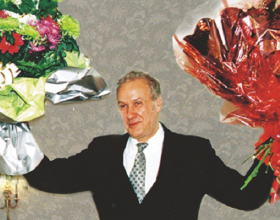2003
|
|
Edgar Niecke (Germany) (1939) Professor of Chemistry, Director of the Department of Inorganic Chemistry, Universiry of Bonn |
Edgar Niecke is one of the most well-known chemists of the XX century and founders of the modern organophosphorus chemistry schoolin Germany.
His primary research concerns the development of molecular compounds having phosphorus-element-(π-π)-bonds and, thus, phosphorus in low coordination. Experimental and theoretical structure and reactivity studies were carried out on abroad variety of systems such as iminophosphanes (behaving as singlet carbenes), phosphaalkenes, bis(ylene)phosphoranes, phosphaallylic and phosphacarbenoid systems, monomeric metaphosphate analogues, as well as other unconventional compounds such as iminophosphenium and methylenediylphosphenium cations.The discovery of stable E- and Z-diphosphenes and the characterization of umbrella shaped species are worthy of specialattention.
His current activities are focused on two research fields:
1. Design of tridentalhybrid ligands with low-coordinated phosphorus centers for the synthesis of novel macrocycles containing ligands with discriminative functionalities and redox activities and
2. Chemistry of unique stable diradical phosphorus heterocyclic systems, 1,3- diphosphetane-2,4-diyls, which are enabled to react as crypto-carbenes and/or can undergo mesolytic fragmentations. A Long term perspective of the latter research is to develop the chemistry of phosphorus-containing polyradicals as non-metallic magnets.

